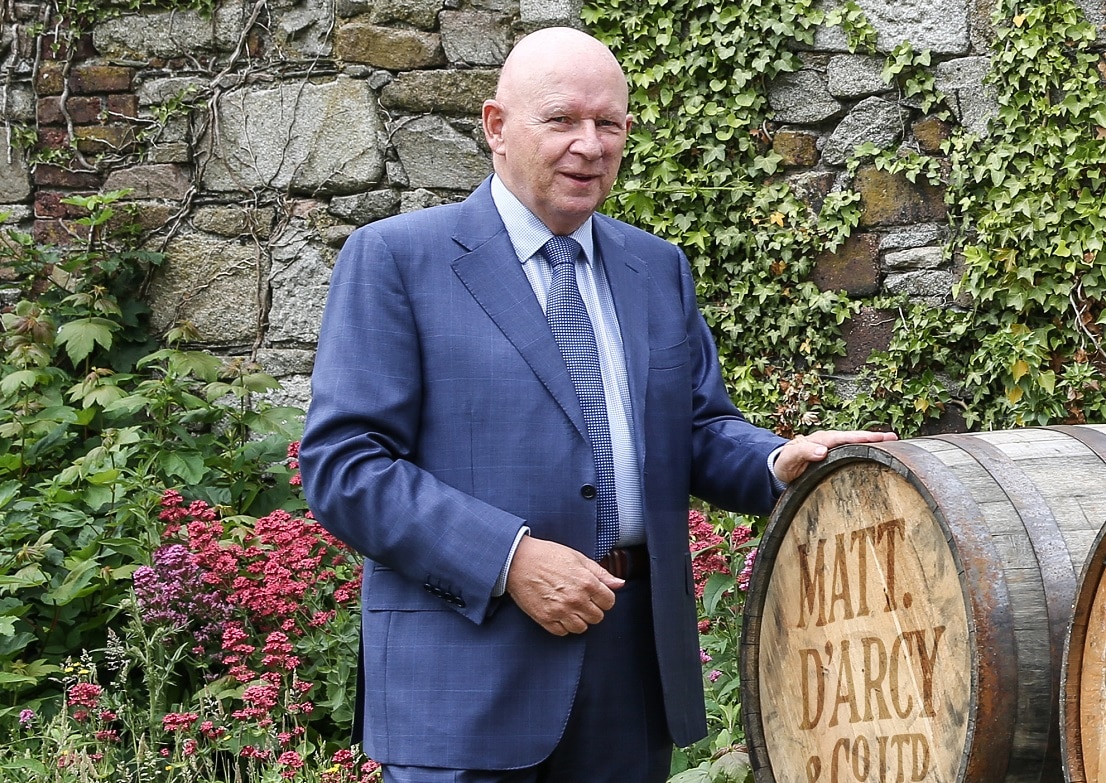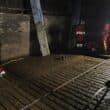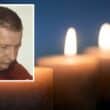
From teaching to distilling award winning drams of whisky, a County Armagh man is lifting spirits in reviving an age old tradition in the city of Newry.
One of a family of 11, Michael McKeown, the innovator behind Matt D’Arcy Whiskey, describes himself as a ‘north Armagh’ man, having been brought up and lived in Annaghmore, Lurgan and nearby Silverwood.
It would appear that the trade of providing delectable alcoholic beverages may be in his blood, with his parents, Kitty and Terry, being behind former drinks supply and off-licence business, Reihill-McKeown.
However, it has not been all plain sailing for the 74-year-old who, on various occasions, by his own admission, should have been “dead and buried” long ago, having on one occassion racked up losses of over £1.7 million in the mid 1980s!
Speaking to Armagh I, Michael explained that prior to going into the business of wines and spirits, his father had worked as a barman in Belfast before returning to Annaghmore in the 1930s to set up a fruit business.
Michael said: “Businesses that you still see there like McNeice Brothers and Mackles, my father was in business at the same time as their parents and they were all neighbours, living within three or four miles of each other.”
However, in the early 1940s, a massive opportunity appeared for Michael’s father in neighbouring Lurgan.
“The Americans began to arrive and my grandmother of my mother’s side owned a pub in a back street of Lurgan, which just so happened to have the Yanks’ camp at the end of it,” Michael explained.
“My father took over that pub and made a tidy wee fortune during the war years.”
But upon setting up shop at that bar in Lurgan, Michael’s father encountered a great difficulty getting supplies.
He said: “Your supplies were based on what you bought from your wholesalers in 1938 and ’39, but the pub was closed from 1937 so he had no supplies.
“So, he literally went to people who had some supplies in other pubs, and other towns where they didn’t have the Yanks. He bought the stuff off them at a great price to them, and brought it back to Lurgan and sort of doubled the price to the Yanks.”
Not born until 1946, Michael explained how his older siblings had gone from living on a farm with orchards to growing up in the midst of a pub.
In around the year of his birth, Michael’s father decided that he needed to start supplying himself and moved the family to Silverwood, after setting up a business as a wholesaler and bottler.
From his formative years, in which Michael “literally grew up among bottles and barrels”, he went on to attend St Patrick’s Grammar School, Armagh, where many of his brothers had gone before him.
“So three of my brothers went into the family business, which, although it was growing all the time, I thought I would avoid it and so I went to look for a profession.”
However, whilst engaged in his studies Michael found a new hobby which, he admitted, interfered with his grades.
“I turned myself into the school photographer and I just switched off school work,” he said. “Sixty years later, I see people writing on school blogs saying “I think Michael McKeown took that picture in such and such a place’.
“As a result, I made a complete hash of my A-levels; instead of getting an A and two B’s, I got a B, a D and an E which at that time qualified me to go into teacher training.”
But once more, the young Michael had his head turned. In his second year of teacher training, he began making videos for the PE department and even unsuccessfully applied for a job as a BBC cameraman.
Whilst teaching, Michael continued to work for the family businesses, which by this stage consisted of the Orchard County Hotel, The Shamrock Chalet and a very fast growing wholesaler in wines and spirits.
He recalled: “After three years into teaching I had done other things also. I had built a house in Annaghmore, Portadown, working after school in the afternoons and then when it got dark I went on and worked in a pub.
“The only thing I ever knew was work because my father was working all the time. He died around that time, but myself and my brothers inherited that work ethic.”
Phrases such as “keep doing something”, “you couldn’t be finished” and “you must have to go and fix something” were mantras passed down from his father.
So much so in fact, that Michael says to this day he continues to have multiple projects running, just in case he should get “bored”.
Looking back, he commented: “I can remember listening to the teachers in the school saying ‘I have a great idea’ or ‘I am going to do this or that’. I just thought, I am going to go off and do things.
“Everybody can talk about doing something but not everyone does. It is why we should encourage young people to get started.”
He added: “I later discovered, although it was probably not fully researched at the time, that young people’s brains are not fully developed, which is why they ride motorcycles and drive souped-up cars.
“It is the same in business, just jump into it and when it overwhelms you, the key is, what is now expressed as ‘how to eat an elephant’, taking small chunks as you cannot do it all at once.”
Michael left teaching in 1971 to help out with the family business but later left, and for a short time, to join one of his brothers in America.
He explained: “In August of ’75, I decided to go out to California to join my brother who owned a liqour store out there and was redeveloping apartments.
“So I put the house up for sale in Annaghmore. I brought the wife and family over to America but it didn’t last.”
The sale of the house, which was to support the family in America and fund purchase of a bar in San Francisco, delayed and in fact was only completed upon them returning – in Michael’s own words leaving him with “money in my hand and no home”.
Upon returning, Michael applied for all manner of jobs but found himself securing a place as a substitute teacher at a school in Craigavon.
“After a gap of four years to five years of not being in the classroom, I was invited to do two days but, by the afternoon of the first day, I said ‘no I just can’t do this’”, he said.
After doing a bit of research on what Lurgan needed, Michael found the industry into which he wished to embark … a travel agents.
He said: “At the time, there was only one travel agent but, quite frankly, that was a Protestant travel agent at the far end pf the town. So I opened the Catholic one but I never got to sit down in the offices there.
“When I was preparing to go to open my office, the landlord asked me for insurance, so I contacted a man called Billy Carroll in Keady, who had been our family insurance broker and he started to tell me all his own woes, that he was approaching retirement and that his sons had already chosen other career paths..”
Despite Billy Carroll having dealt with the family’s insurance for generations, Michael admitted that he had never set foot in Keady by this time.
“I went up to Keady on the Wednesday afternoon at two o’clock and by half four I owned half of Billy’s business.”
Michael brought in his younger brother to run the travel agents and eventually sold this to the same sibling.
Meanwhile, within the first couple of years in the insurance game, Michael was able to double the income from Billy’s business.
Previously for the family business, Michael had created systems for accounting using computers “the size of washing machines” and carried this into the new venture.
“My first computer programme, I sold it to about 12 or 14 people around Northern Ireland. It was based on an Apple IIe computer with a 56K memory, not 56 megabytes,” he joked.
The insurance business was booming and expanded with locations set up in Lurgan and Craigavon but all was about to change.
With the idea of internet in its infancy, Michael had the thought of converting his “floppy disc” programmes into an online format.
Recalling back a date in April of 1983, he said: “I called my assistant into my office, I told him ‘Gordon, sit there in my seat, do you like that seat? Good, because I’m off’.”
After getting a loan and remortgaging £15,000 from his “lovely Victorian home” in Lurgan, Michael began a computing business.
He said: “The £15,000 lasted about a week once I started to employ people, making this online system 10 years before the internet existed. I must have been mad.
“What makes you do those things? I think I that I didn’t want someone else to do it before me and I didn’t want any regret.”
Three years in, Michael’s business had a profit & loss account with a figure of minus £1.73 million and by his own admission should have been “dead and buried”.
“What happened next is the story which happens to me time and again, something happens at the minute when I should have been commercially dead….if you saw it on a Netflix drama you would say it was nonsense.”
In the background, the UK Government were changing the world of the insurance industry with legislation regarding best advice, which became law in 1987.
Michael commented : “Best advice is what I began practicing from the day and hour I arrived in Keady. In a rural setting everybody knows everybody. So, you look after them as if they’re your mother or your brother.
“But the big wide world of insurance over in the UK market didn’t have fathers and mothers, they just had victims.”
So, unbeknownst to himself, Michael had developed a best advice system which led to him being courted by big insurance companies and British Telecom.
“Eighteen months later, we had 18,000 users and a nice piece in the Belfast Telegraph about a wee man from Lurgan who anticipated a whole raft of legislation,” joked Michael.
“It is madness when you think of the hundreds of people around you are going into liquidation or becoming broke. What was the difference? I don’t know. I really don’t know.”
Following on from this, Michael’s next venture, accident management company, Crash, will be one which is well known in these parts of the world.
He said: “It did quite well at the beginning because it was novel, but we didn’t actually know what we were doing. I did not realise the venom of insurance companies for those who come on to their patch.
“They didn’t want anybody to help the clients deal with the claims and I was totally innocent of that.”
This led to a number of legal battles, one of the worst coming in 2000 when the Court of Appeal in England wiped out debts due to CRASH of £400,000.
However, as is the case with all of the battles which Michael faced, he made it through and subsequently sold the business to his son, Jonathan.
That was the end of story, or it was meant to be, but for one faithful meeting of the Chamber of Commerce in Newry whilst Michael was president.
At an enterprise event, a plan was given from council in order to assist those in setting up new businesses.
“I had a look at the plan, they wanted regeneration of the streetscape, they wanted to bring the town back to life, they wanted tourism, they wanted to work on export markets, and I had an idea that ticked all the boxes.”
However, it was not a simple task, especially for an avid historian.
Michael explained: “Being my usual perfectionist, I decided I wanted to build on the site of the original distillery. It took me 18 months to find where it was.”
Looking back on his career, he commented: “If I had to try and analyse and throwing away all modesty, I would say not everybody can get started or succeed in business.
“There’s lots of people who are technical managers, who can keep things going by sticking to a rule book. What separates people like me apart, is that we are able to communicate the vision to the troops, but we are not necessarily able to carry out the execution of the task. We need those expert managers to succeed.”


